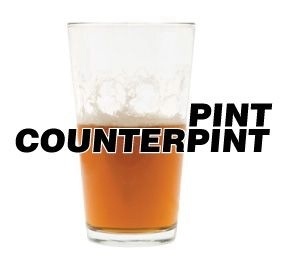 Pint/CounterPint was created when Adam Watson (Against the Grain Brewery) wrote a loving response to the first Baylor on Beer article, Know your Enemy, written by Roger Baylor (New Albanian Brewing Company). At first we laughed whole-heartedly and admired the conviction and stance of both parties, and then we thought, “Hey, wait a minute… remember that old 60 Minutes segment called Point/Counterpoint?”
Pint/CounterPint was created when Adam Watson (Against the Grain Brewery) wrote a loving response to the first Baylor on Beer article, Know your Enemy, written by Roger Baylor (New Albanian Brewing Company). At first we laughed whole-heartedly and admired the conviction and stance of both parties, and then we thought, “Hey, wait a minute… remember that old 60 Minutes segment called Point/Counterpoint?”
For those of you that don’t, Point/Counterpoint was a segment of the CBS Television News Magazine, 60 Minutes. Point/Counterpoint was a debate between spokespeople for the political right and left, respectively. This segment pioneered a format that would later be adapted by CNN for its Crossfire show. LouisvilleBeer.com adopted the format for an online debate between Adam and Roger. Welcome to Round 6. DING!
…………………………………………
Pint/CounterPint 7:1
Beer Cellaring: Is This What the Brewers Want You to do? – YES
By: Roger Baylor, New Albanian Brewing Company
Of course brewers want you to cellar their beer, and it all goes back to the time-tested imperative that if being yourself isn’t good enough, just borrow someone else’s self-definition and claim it for your own.
Let’s take a glance across the aisle to the assembled delegation of our fellow fermenters – of grapes, not grain. Back in medieval times, just before the Beatles, the American wine industry got wise.
Hell, they didn’t have much choice.
Wine snobs wouldn’t give any love to American-made vino, at any price. The card-carrying oenophiles went French or they went home — to upstate New York, to try and find some way of making Concord grapes marginally palatable, usually by going the extra mile and making brandy out of them. It’s a more cost-efficient buzz that way.
In essence, the wine people soon discovered the post-WWII joys of marketing, a revolting philosophy that hit its stride as baby boomers began the long march advance toward legal drinking age.
Henceforth, there would be a culling. As components of a strikingly successful political lobby, all wine makers would remain quite equal, even the ones spiking their vilest plonk with leftover vodka to produce Mad Dog. But when it came to selling the idea of wine, and conjuring some homegrown mystique, most of the rhetorical powder would be kept dry for the sole purpose of presenting the better American winemaking traditions as exemplars of elegance, culture and pairing with food – something for recovering fundamentalists to strive for.
The rest is pre-emptive drinks history. Benefitting immeasurably from this astute linkage between upward mobility and fortified grape juice, domestic wine-making had time to coalesce. First came Californian wines, and then products of various other terroir-itories followed, gradually developing reputations for quality. Amid rampant French muttering, American vintners began besting the Old World at its own game – and in locales across the globe (Chile, Australia and even some Muslim countries on the down-low), exporters joined in the fun.
Meanwhile, the makers of Mad Dog went their merry way, targeting adolescents in low-income urban area and repatriating their windfall profits to the Seychelles, where there is no native wine but imported Scotch pours like desalinated ocean water.
Now, the reason I’m telling you these things is because once the rubes in the backwaters became aware that knowledge of fine wine was essential in selling more whole-life insurance policies, they joined wine-of-the-month clubs where permitted by state law, and where not, enlisted in smuggling rings or merely patronized local package stores, where the pricing rule of thumb always held that wine mark-ups should be higher than beer or spirits because the newly ordained wine snobs wouldn’t know any better.
(Remember, we’re talking about package sales. Those $50 bottles of Chianti accompanying spaghetti and meatballs at O’Brien’s Italian Wine Bar and Trattoria are a topic for another day.)
Had it been confined solely to understanding and enjoying better wine, this emerging cult of the wine snob would have died on the vine, but it was far more than that. It was about psychology, peer groups, self-definition and being seen as fashionable; perhaps most importantly, it was about wine as an investment vehicle. Wine buffs already were compulsive readers of the Wall Street Journal, those crates were starting to pile up in the basement, and it didn’t take them long to put two and two together: Find the expert to tell them what their own palates could not, use the expert’s tips to buy low … and cellar the wine, so as to sell high when the time finally arrived.
Given that beer and wine are much alike in the sense of being best consumed in the flower of rambunctious youth, much wine has been cellared that should have been paired with beanie-weenies during the disco years, but it is of inestimable value to master the ability to cock an eyebrow, curl one’s lips into the faintest suggestion of a smile, and praise the oxidation in a superannuated Shiraz as the “essence of the vintner’s wisdom.”
This brings us to the conclusion.
Of course brewers want you to cellar their beer. It all goes back to the time-tested imperative that if being yourself isn’t good enough, just borrow someone else’s self-definition and claim it for your own. Now if you’ll excuse me, I must get back to this glass of 2009 Urquell. The noble musty puffballs are like none in recent memory, and my handkerchief is wet with tears of redemption.
If only I had a plate of rotten meat to go with it.
Pint/CounterPint 7:2
Beer Cellaring: Is This What the Brewers Want You to do? – NO
By: Adam Watson, Against the Grain Brewery

MORTAL KOMBAT!!! Ok, so it’s probably not as dramatic as all of that, and I certainly can’t kick like Liu Kang, but it is time again for another overly verbose battle between the Curmudgeon and the Wizard. May the least worst win.
John “Ticklebilly” Wurth has asked us to duke it out over the topic of end-user cellared beer. Basically, should a consumer buy a bottle of beer and then hide it in the basement for an intentionally extended period of time? If you read my replies to comments on Beer Wizard articles, you will know that I am generally opposed to this practice. There are certainly exceptions to this such as bottle conditioned beers and beers that come with specific cellaring instructions on the label itself, but outside of those narrow exceptions, beer should be consumed reasonably quickly after purchase and not left to wither on the proverbial vine. Beer is a living creature. At least for the purposes of this discussion. Let’s go ahead and make the assumption that highly filtered, completely sterilized, immaculately-preserved beers are not the kind of thing anyone is thinking about cellaring anyway. Everyone on board? Good.
The first reason I am against this sort of cellaring is that it increases the possibility of mishandling. If you read my Beer Wizard article on packaging issues, you should be at least vaguely familiar with the veritable minefield of spoilage issues that can occur, especially at unrefrigerated temperatures. These issues apply whether the aging is intentional or not. The microbes in a beer don’t care if that beer got lost behind a display case or if it has been enshrined in your mom’s basement. They are going to do what they do either way. You do, of course, reduce this sort of problem if you manage to store all your beer in refrigerated conditions. You do store all your beer in refrigerated conditions, right? Not all issues can be resolved with a refrigerator, though. Some mishandling may have occurred before you ever laid eyes on your precious rarwhal. The longer you leave that beer after the mishandling happens, the greater the damage may be.
The second reason not to sit on your beers too long may be a problem unique to me, but I thought I’d throw it out there to see if anything resonates. I forget things. I forget my keys. I forget if I’ve eaten lunch yet. I forget important birthdays. If I had a huge pile of beers sitting in my basement, I would surely forget how long each beer had been there and when I meant to drink it. Even if I had the uncanny ability to buy a beer and know how long it should be aged to maximize the pleasure I am going to get out of it, I would also need the uncanny ability to remember things. I suppose I could load my phone calendar up with a bunch of alerts to let me know when I should be drinking all the beers I buy, but that seems a little ridiculous to me.
Lastly, and perhaps most importantly, it is the brewer’s job to release a beer when it is ready to drink. I realize this job often falls to a cellarman rather than a brewer, but let’s not squabble about job titles. We have enough to squabble about. The brewer is the one who knows the most about the beer and is best equipped to monitor and maintain its conditions. If cellaring is required to reach the intended flavor, the brewer needs to do that cellaring before selling the liquid. If brewery space simply doesn’t allow that, I can understand some sort of cellaring instructions on the label to encourage people to let whatever is supposed to happen happen. Although certain beers can improve with age and adequate care can prevent bad things from happening, beer is not a beverage that generally does better with age. Most beer, especially of the hoppy varieties, is best consumed fresh. Hop flavors do nothing but degrade over time, so you are going to get the most bang for your buck by drinking it as soon as possible after the yeast processes are done. Every brewer wants their beer to be consumed at the peak of flavor, and that makes it their responsibility to make it available at that time, not years earlier.
If you want to cellar bottles simply for the joy of collecting rare beers, more power to you. If you want to engage in the risky experiment of tasting beers after they have passed their prime, go right ahead. But don’t sit on a bunch of great liquid under the delusion that you know more about a brewer’s beer than they do. If you want beer to taste good, drink it at the right time, and that time is now.






